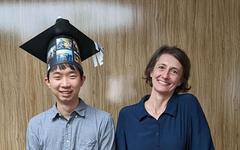URL: https://www.desy.de/news/news_search/index_eng.html
Breadcrumb Navigation
DESY News: Helmholtz PhD Award for DESY student Peera Simakachorn
News
News from the DESY research centre
Helmholtz PhD Award for DESY student Peera Simakachorn
The Helmholtz Association has awarded DESY PhD student Peera Simakachorn the PhD Prize for Mission-Oriented Research in the Research Field Matter. Simakachorn received the award on 3 May at a meeting of the Strategic Advisory Board (SAB) of the Research Field, where he also presented his work. He is one of two awardees in the Helmholtz Research Field Matter.
Peera Simakachorn is a theoretical particle physicist from Thailand. He came to Hamburg from the Suranaree University of Technology with the help of one of the very prestigious scholarships from the Royal Government of Thailand to pursue a Master´s degree in Mathematical Physics at the University of Hamburg. Following his Master thesis in the DESY theory group, he began his doctorate within the Cluster of Excellence “Quantum Universe” at the University of Hamburg and DESY.
His doctoral thesis entitled “Charting Cosmological History and New Particle Physics with Primordial Gravitational Waves” covers a very broad spectrum of topics in the cosmology of the early universe, so-called primordial gravitational waves, axion physics and particle physics beyond the Standard Model in general. For example, he investigated signs of new physics in the stochastic gravitational wave background of primordial origin, and how they can be probed with currently running and future observatories in a vast range of frequencies. His work has helped provide the science case for future experiments, especially the Einstein Telescope and the spaced-based interferometer LISA, as well as pulsar timing arrays, for instance with SKA. In addition, Peera Simakachorn has also investigated gravitational waves in the ultra-high frequency range, currently uncharted scientific territory. Here he has made new and significant predictions for gravitational wave signals of cosmological origin which should motivate new ideas for gravitational wave detection in this very difficult frequency range.
After his docotorate which was surveyed by Geraldine Servant (DESY and University of Hamburg), Peera Simakrachorn is now conducting research at the University of Valencia as a postdoc, working with gravitational wave expert Daniel Figueroa. After his stay in Valencia, he has the firm intention to return to Thailand and establish a research group there.




